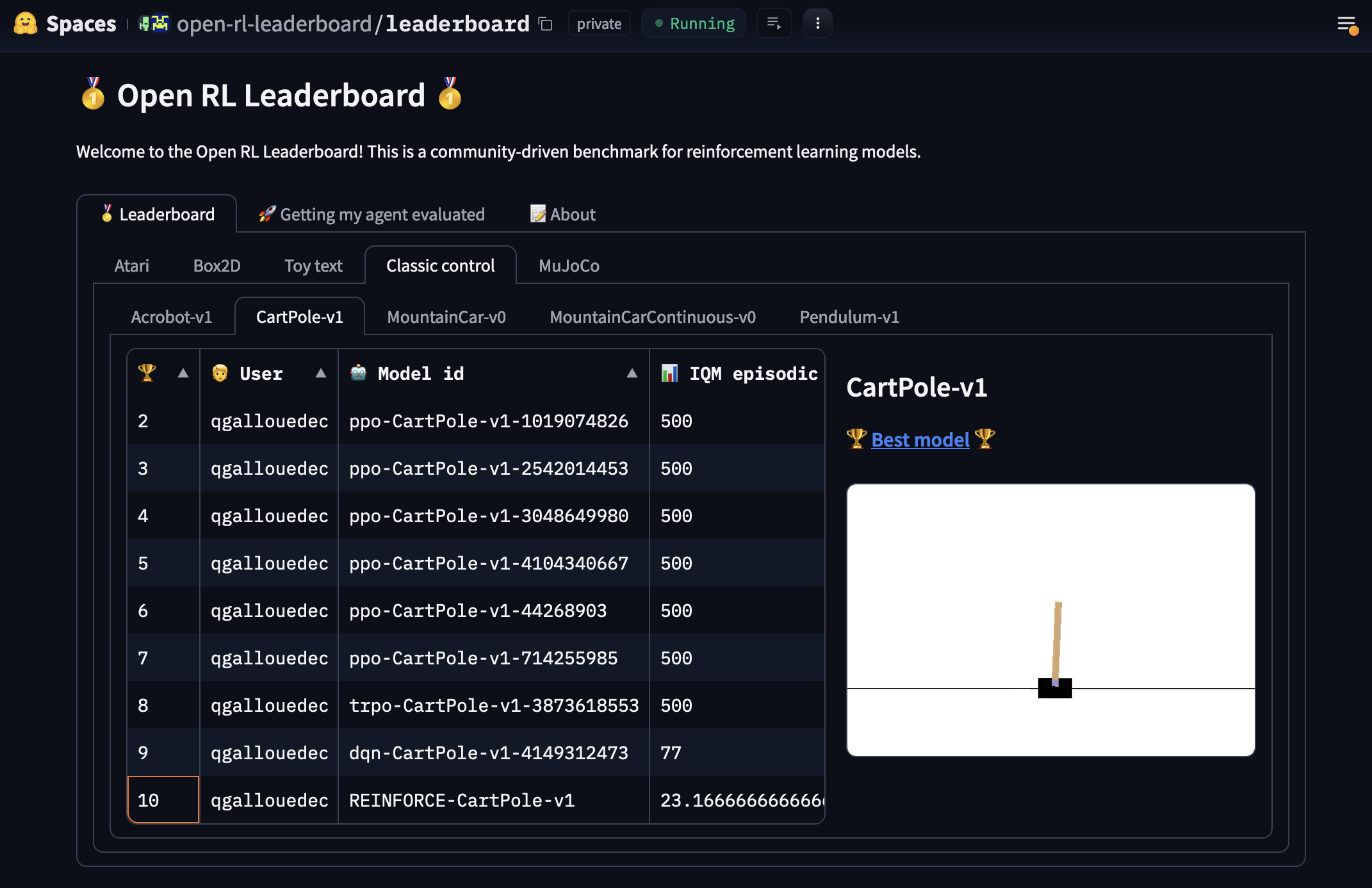Spaces:
Runtime error
Runtime error
| In this guide, we explain how to get your agent evaluated by the [Open RL Leaderboard](https://huggingface.co/spaces/open-rl-leaderboard/leaderboard). For the sake of demonstration, we'll train a simple agent, but if you already have a trained agent, you can of course skip this step. | |
| If your agent is already on the 🤗 Hub (trained with Stable-Baselines3, CleanRL, ...), we provide [scripts](https://github.com/qgallouedec/open-rl-leaderboard-utils) to automate conversion. | |
| ## 🛠️ Prerequisites | |
| Ensure you have the necessary packages installed: | |
| ```bash | |
| pip install torch huggingface-hub | |
| ``` | |
| ## 🏋️♂️ Training the agent (optional, just for demonstration) | |
| Here is a simple example of training a reinforcement learning agent using the `CartPole-v1` environment from Gymnasium. You can skip this step if you already have a trained model. For this example, you'll also need the `gymnasium` package: | |
| ```bash | |
| pip install gymnasium | |
| ``` | |
| Now, let's train the agent with a simple policy gradient algorithm: | |
| ```python | |
| import gymnasium as gym | |
| import torch | |
| from torch import nn, optim | |
| from torch.distributions import Categorical | |
| # Environment setup | |
| env_id = "CartPole-v1" | |
| env = gym.make(env_id, render_mode="human") | |
| env = gym.wrappers.RecordEpisodeStatistics(env) | |
| # Agent setup | |
| policy = nn.Sequential( | |
| nn.Linear(4, 128), | |
| nn.Dropout(p=0.6), | |
| nn.ReLU(), | |
| nn.Linear(128, 2), | |
| nn.Softmax(-1), | |
| ) | |
| optimizer = optim.Adam(policy.parameters(), lr=1e-2) | |
| # Training loop | |
| global_step = 0 | |
| for episode_idx in range(10): | |
| log_probs = torch.zeros((env.spec.max_episode_steps + 1)) | |
| returns = torch.zeros((env.spec.max_episode_steps + 1)) | |
| observation, info = env.reset() | |
| terminated = truncated = False | |
| step = 0 | |
| while not terminated and not truncated: | |
| probs = policy(torch.tensor(observation)) | |
| distribution = Categorical(probs) # Create distribution | |
| action = distribution.sample() # Sample action | |
| log_probs[step] = distribution.log_prob(action) # Store log probability | |
| action = action.cpu().numpy() # Convert to numpy array | |
| observation, reward, terminated, truncated, info = env.step(action) | |
| step += 1 | |
| global_step += 1 | |
| returns[:step] += 0.99 ** torch.flip(torch.arange(step), (0,)) * reward # return = sum(gamma^i * reward_i) | |
| episodic_return = info["episode"]["r"][0] | |
| print(f"Episode: {episode_idx} Global step: {global_step} Episodic return: {episodic_return:.2f}") | |
| batch_returns = returns[:step] | |
| batch_log_probs = log_probs[:step] | |
| batch_returns = (batch_returns - batch_returns.mean()) / (batch_returns.std() + 10**-5) | |
| policy_loss = torch.sum(-batch_log_probs * batch_returns) | |
| optimizer.zero_grad() | |
| policy_loss.backward() | |
| optimizer.step() | |
| ``` | |
| That's it! You've trained a simple policy gradient agent. Now let's see how to upload the agent to the 🤗 Hub so that the [Open RL Leaderboard](https://huggingface.co/spaces/open-rl-leaderboard/leaderboard) can evaluate it. | |
| ## 🤖 From policy to agent | |
| To make the agent compatible with the Open RL Leaderboard, you need your model to take a batch of observations as input and return a batch of actions. Here's how you can wrap your policy model into an agent class: | |
| ```python | |
| class Agent(nn.Module): | |
| def __init__(self, policy): | |
| super().__init__() | |
| self.policy = policy | |
| def forward(self, observations): | |
| probs = self.policy(observations) | |
| distribution = Categorical(probs) | |
| return distribution.sample() | |
| agent = Agent(policy) # instantiate the agent | |
| # A few tests to check if the agent is working | |
| observations = torch.randn(env.observation_space.shape).unsqueeze(0) # dummy batch of observations | |
| actions = agent(observations) | |
| actions = actions.numpy()[0] | |
| assert env.action_space.contains(actions) | |
| ``` | |
| ## 💾 Saving the agent | |
| For the Open RL Leaderboard to evaluate your agent, you need to save it as a [TorchScript module](https://pytorch.org/docs/stable/jit.html#) under the name `agent.pt`. | |
| It must be loadable using `torch.jit.load`. Then you can push it to the 🤗 Hub. | |
| ```python | |
| from huggingface_hub import metadata_save, HfApi | |
| # Save model along with its card | |
| metadata_save("model_card.md", {"tags": ["reinforcement-learning", env_id]}) | |
| dummy_input = torch.randn(env.observation_space.shape).unsqueeze(0) # dummy batch of observations | |
| agent = torch.jit.trace(agent.eval(), dummy_input) | |
| agent = torch.jit.freeze(agent) # required for the model not to depend on the training library | |
| torch.jit.save(agent, "agent.pt") | |
| # Upload model and card to the 🤗 Hub | |
| api = HfApi() | |
| repo_id = "username/REINFORCE-CartPole-v1" # can be any name | |
| model_path = api.create_repo(repo_id, repo_type="model") | |
| api.upload_file(path_or_fileobj="agent.pt", path_in_repo="agent.pt", repo_id=repo_id) | |
| api.upload_file(path_or_fileobj="model_card.md", path_in_repo="README.md", repo_id=repo_id) | |
| ``` | |
| Now, you can find your agent on the 🤗 Hub at `https://huggingface.co/username/REINFORCE-CartPole-v1`. | |
| ## 📊 Open RL Leaderboard evaluation | |
| At this point, all you have to do is to wait for the Open RL Leaderboard to evaluate your agent. It usually takes less than 10 minutes. | |
| Speaking of which, my agent has just appeared on the leaderboard: | |
|  | |
| Last place 😢. Next time, our agent will do better 💪! | |